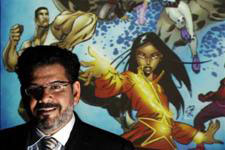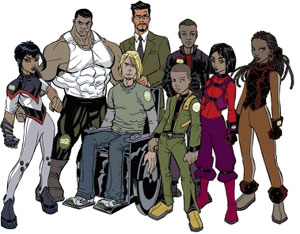The 99: Coming To America
By Philip Schweier
October 16, 2007 - 08:14
In recent years, comic readers have found themselves reading titles that are based on numbers. Marvel published 1602, and DC pioneered the weekly series with 52. On Oct. 17, Teshkeel officially introduces The 99 to American readers.
Who-wha?
 |
The world's press has honored The 99 with major coverage in the Wall Street Journal, New York Times, Le Monde, Washington Post, La Republica, Time and Newsweek magazines. The comic's popularity has grown beyond the Middle East to include southeast Asia, and is now reaching American audiences.
Despite its origins in Islamic culture, Fabian Nicieza, who co-writes the book with Teshkeel CEO Naif Al-Mutawa, cautions readers against thinking of The 99 as "a Muslim comic book." He points out, "It's really nothing of the sort. It's a comic book featuring Islamic characters, but from all different parts of the world and all different walks of life, no different than the X-Men from Marvel Comics."
According to Al-Mutawa, the key message is that the 99 attributes of Allah are global human attributes for all people aspire to. "Attributes like generosity, strength, wisdom, foresight, mercy and dozens of others that are not used to describe Islam today," he says. "These attributes are fundamentally human and do not belong to any one culture. Our similarities as people far outweigh our differences."
The comic book features 99 heroes, none of which have a religion. "There are no identifiable religious practices or faiths promoted in the books," says Al-Mutawa. "They are based on an Islamic archetype very much in the spirit that Spider-Man and Superman are based on Biblical archetypes."
The story of The 99 begins in the 13th century, as Baghdad is besieged by the army of Hulagu Khan. Guardians work feverishly to safeguard the sum knowledge of the empire's libraries, instilling the vast lore into 99 gemstones that, in the generations to follow, are scattered throughout the world.
In modern times, Rughal, a centuries-old scholar who knows the secret of the gems, attempts to locate the gemstones and exploit them. Dr. Ramzi Razem hopes to use the power of the gems to benefit mankind.
 |
Al-Mutawa says that the possessors of the stones come about them in 99 different ways. "There is a King Arthur element to the stories as well. Not anyone with a stone can use its powers." He goes on to say the heroes need to work in teams of three that are best suited to solve a particular problem.
The 99 comic was created out of a promise Al-Mutawa, a UNESCO award-winning childrens writer, made to his sister. "I had been frustrated by local censors and so I had given up writing for five years. Her reminding me of a promise I made that I would go back to writing in the summer of 2003 led to a response from me that if I were to go back, it had to be a concept that had the potential of Pokemon."
 |
In the course of a 15-minute London Cab ride, The 99 was born.
Choosing the comic book format was a decision he made after consulting with comics professionals such as Tom DeFalco, Michael Hobson, Jimmy Palmiotti, Justin Grey and Fabian Nicieza, who would go on to co-write the book with Al Mutawa.
Nicieza met Al Mutawa through good friend Sven Larsen. "Sven had just been hired by Teshkeel," Nicieza says. "At the time, Al Muatawa was struggling to develope the super-hero title. He (Larsen) recommended that I meet with Naif and talk the ideas through. We met. We talked. Here we are."
Al-Mutawa credits Nicieza, who has written numerous titles for Marvel and DC, with "professionalizing" the character bible. "It had already been created when he came into the picture, but it did not have the 'umph' that someone with industry experience could give it."
In writing the book, Nicieza chose a "straight" approach, not considering cultural aspects too deeply. "I focus more on the structure of the story, and the characterization. Once I do a first pass, it gets 'vetted' by Teskeel and appropriate references are inserted or scenes edited to better reflect cultural understanding."
Nicieza cites challenges in translating his American-entertainment mindset into something that will be more easily understood and appreciated by other cultures. "Sometimes, a simple shorthand joke or character reference that I know everyone in America would understand wouldn't play elsewhere, or managing the male/female relationships in such a way that they are culturally relevant while not being improper."
 |
Despite any cultural differences, the core concept of The 99 is easily understood by fans of the super-hero genre. Nicieza describes it as "...a man who believes he can do good things for this world and the people who join him in making that dream a reality, no matter the hardships or challenges they must overcome to do so. It's a cross-section of the world's various cultures, sending a very clear and important message that we really are all one and we are nothing alone, but together we can do anything."
Art is handled by Dan Panosian (character designer), John McCrea (penciler), James Hodgkins (inker) and Monica Kubina (colorist).
In just over a year since the debut of The 99, the book is expanding on a global scale. In August, Teshkeel announced a partnership with Indonesian publisher Femina Group to license The 99 in southeast Asia. An online version is also available through qmags.com
Teshkeel's plans for expansion also include developing a girls’ spin-off series. "We have 99 characters with the need of a combination of three to solve any one problem," Al-Mutawa explains. "Because half the heroes will be girls, some of the triads will be female only and we are working on developing a girls’ line based on it."
In the meantime, Nicieza promises a growing cast. "New heroes! New villains! Bigger scope and scale to their responsibilities! Mistakes and consequences! Beatlemania! Secret identities! And more."
For more information, including an online preview, please visit www.the99.org.
Related Articles:
The Power of One (1992)
Southern Hemisphere Greets THE 99
The 99 Heads to 2012 Olympics
Whisper of the Heart (1995)
The 99 – Buying Yourself Influence, Prestige and Power through Comic Books
The First Captain America Film from 1990 That Never Was
JLA/the 99 # 1 (of 6)
Iron Man: The complete 1994 animated television series
'The 99': Muslim Superheroes take on the world in new animated series and comic books
The 99 #5 Ships in XL Size
